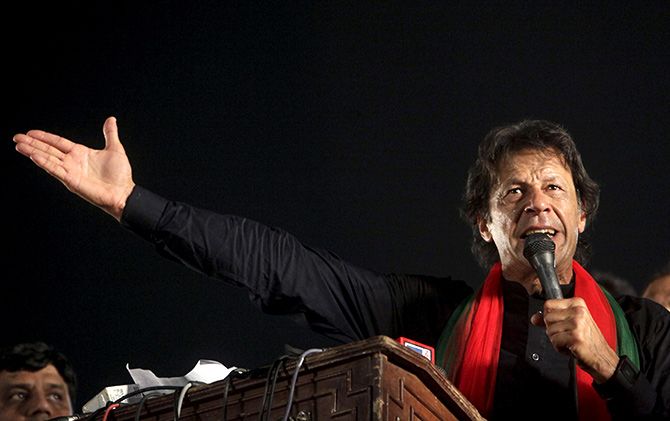The Pakistani election on July 25 has a strong Indian flavour and connection, says Vivek Shukla.

The sun is setting as some villagers in a local gurdwara in Jatti Umrah, Taran Taran district, less than 40 miles from Amritsar, discuss the general election in neighbouring Pakistan.
If they had a vote, it would have gone to Shahbaz Sharif's party, the Pakistan Muslim League-Nawaz, without an iota of doubt.
It is certainly not due to the PML-N's pro-poor or pro-farmer policies, but for other reasons.
Well, these villagers identify with Sharif as his family traces its roots to Jatti Umrah. Shahbaz Sharif even came calling here in 2013 as chief minister of Pakistan's Punjab.
The Pakistani election on July 25 has a strong Indian flavour and connection.
Not only Shahbaz Sharif, even Pakistan Tehrik Insaf Party head Imran Khan and Bilal Bhutto, head of the Pakistan People's Party, the other two prime ministerial aspirants, have Jalandhar, Bombay and Junagadh links.
That's not all, if the three big parties fail to get a full majority in the 342-member House, they may seek the support of the Awami National Party or various factions of the Muttahida Qaumi Movement.
The Awami National Party was established by Khan Abdul Wali Khan in 1968, a staunch Gandhian and 'Sarhadi Gandhi' Khan Abdul Ghaffar Khan's son.
Wali Khan used to meet the Mahatma often with his father during the Indian freedom struggle. 'The NAP is totally committed to the ideals of Gandhiji and Khan Abdul Ghaffar Khan,' Afsandyar Wali Khan told the media during his Delhi visit in 2011. The Frontier Gandhi's grandson, his party is contesting the election in Pakistan's Khyber Pakhtunkhwa state.
Interestingly, Asfandyar Wali Khan's party faces an acid test from someone who still proudly talks about his Jalandhar ties -- cricketer turned politician Imran Khan.
Shaukhat Khanam, Imran's mother, came from Jalandhar where his maternal grandparents had a big house in the Basti Danish Manda area. They were at the forefront of building the Islamia College there in the early 1940s.
'My mother's family was based in Jalandhar for over 600 years. It was a real trauma for them to relocate to Lahore. We had several relatives in Jalandhar, all of them were uprooted,' Imran Khan revealed to a couple of Delh scribes in 2004. That was when he visited Jalandhar for the first time.
'Dr Jahangir Khan, the former Indian Test player, and the father of my cousin, Majid Khan, the ex-captain of the Pakistan team, was our neighbour in Jalandhar,' Imran added.
Asad Raza, the well-known Pakistani political commentator, says Lahore has a large concentration of people who hail from Jalandhar and other cities of Punjab's Doaba region like Hoshiarpur, Kapurthala and Nawanshahr.
'They have some kind of unwritten brotherhood. They like to support Imran Khan as they are anticipating the top post for their Jalandharwallah,' Raza says.
Asif Ali Zardari, Pakistan's then president, was spot on when he declared in 2008, 'There is a bit of India in every Pakistani.'
Indeed, Zardari knows this more than anybody else.
His son Bilal Bhutto heads the PPP which was established by his grandfather Zulfiqar Ali Bhutto, who was educated in the prestigious Cathedral and John Cannon School, Bombay.
Bhutto was always taunted by his detractors in Pakistan for moving to the young Islamic nation only in 1950.
In his book Zulfi, My Friend, Piloo Mody, the late Swantantra Party MP, writes, 'In that moment of shock (Gandhi's death) I felt fatherless, countryless and creedless. The next few days were spent in utter despondency.'
'Throughout this period, it was Zulfi who consoled me and nursed me out of my condition, sharing my sorrow, and in commiserating with me, being careful not to say or do anything which would upset me in any way.'
Sir Shah Nawaz Bhutto -- Bilal's great grandfather -- was the diwan of Junagadh state before 1947.
It was he who advised the nawab of Junagadh, Mahabat Khanji, to go with Pakistan instead of India even though Junagadh's population was almost 80 per cent Hindu.
A plebiscite was eventually held to decide what the people wanted. The result was overwhelmingly in India's favour.
And the vagaries of time and the bitter past were forgotten when a special namaaz was offered at the Jama Masjid in Junagadh for Benazir Bhutto after her dastardly assassination in December 2007
The Muttahida Qaumi Movement, a party mainly of all those who migrated to Pakistan post-1947 from Uttar Pradesh, Delhi and present day Madhya Pradesh, is in bad shape.
The MQM has split into two, with both factions, the MQM-Pakistan and MQM-Haqiqi, fighting hard to make their presence felt.
Despite the split, two things are very dear to the parties: Both factions consider the burly, self-exiled Altaf Hussain as their guiding force; They are duty-bound to fight for the just rights of Mohajirs.
While talking about his family ties with Agra and Aligarh, Altaf Hussain told this correspondent in 2004, "I originally hail from Agra. My father was working in the Raja ki Mandi railway station when Partition took place."
"The Mohajirs cannot forget cities like Lucknow, Agra, Meerut. They are proud of their rich past. Sadly, we feel cheated in Pakistan as government jobs are denied to Mohajirs at all levels. We are considered second class citizens in Pakistan," Altaf Hussain added.
There is general disenchantment among the Mohajirs with the election this time. They may not even vote as the big parties hardly care for them, they say.
They are also very annoyed with Shahbaz Sharif who said recently that he will turn 'paan-chewing Karachi into Lahore', which they feel mocks their paan-loving culture.
As the debate ends at the Jatti Umrah village gurdwara, some of them recall Shahbaz Sharif's 2013 visit to this village, which was the family home of the Sharifs before they moved across the Radcliffe Line with a heavy heart.










